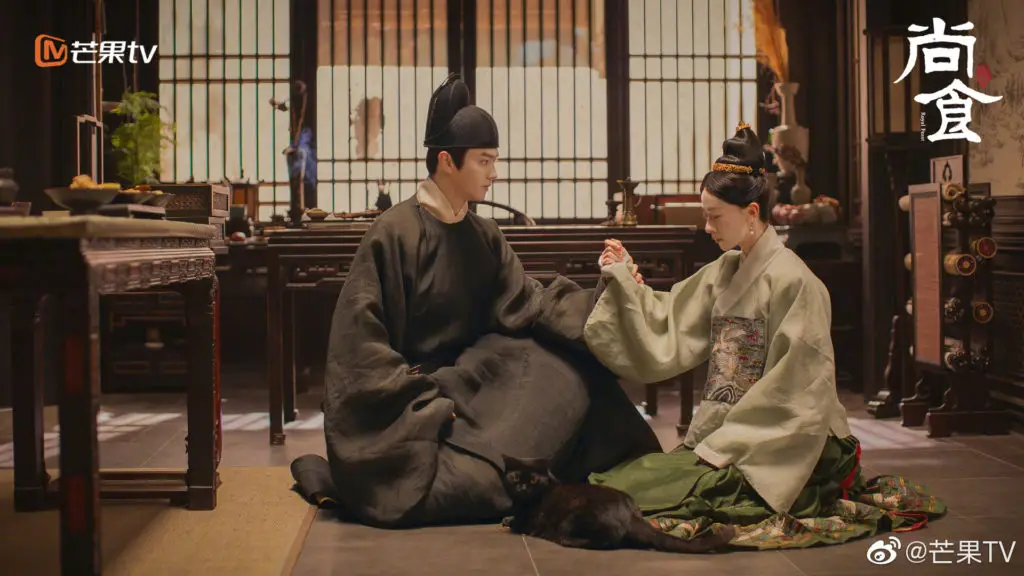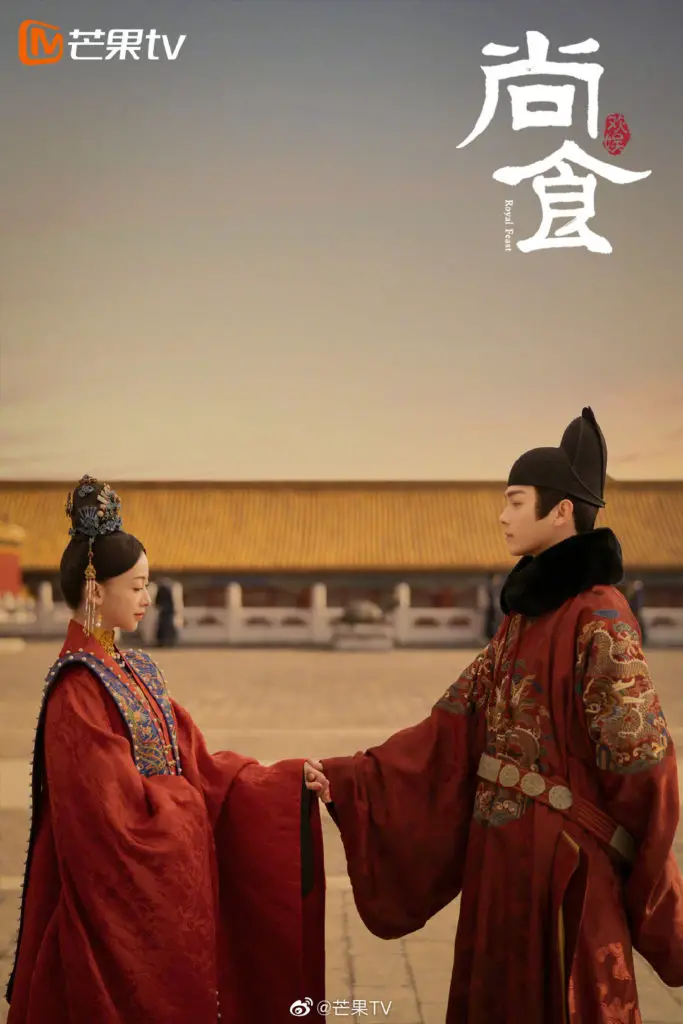
Royal Feast (尚食) is a much anticipated historical Chinese drama starring Xu Kai and Wu Jin Yan. In fact, I was also looking forward to it but with a certain degree of trepidation that it might be a big bore. After all, the title seems to suggest that it is all about luxurious food and sumptuous banquets and the inevitable palace politics that come with it. But it does evoke some curiosity on how the food preparation and politics will be weaved together to give us a story. And is the story worth following? My Royal Feast review below will give you my impression on this drama.
My rating: 7.5/10
Episodes: 40
Type: Historical Romance
Aired: February 2022
Images Credit: MGTV Weibo
The Cast Of Royal Feast
- Xu Kai as Zhu Zhan Ji
- Wu Jin Yan as Yao Zi Jin
- Wang Yi Zhe as You Yi Fan / Lord You
- Wang Chu Ran as Su Yue Hua
- He Rui Xian as Yin Zi Ping
- Zhang Nan as Hu Shan Xiang / Directress Hu
- Wang Yan as Meng Zi Yun / Matron Meng
- Yu Rong Guang as Zhu Di / Emperor Yong Le
- Hong Jian Tao as Zhu Gao Chi / Crown Prince
- Liu Min as Crown Princess Zhang
- Zhang Zhi Xi as Hu Shan Wei
- Wang Dong as Zhu Gao Xu / Prince Han
- Wang Yu as Zhu Gao Sui / Prince Zhao
- Cheng Li Sha as Concubine Guo
- Nina Wang Ke Ru as Concubine Wu
Main Characters

Zhu Zhan Ji
Zhan Ji is Emperor Yong Le’s favorite grandson and expected to inherit the throne one day. He is a smart and responsible prince who is quickly absorbing the lessons on how to rule a nation from his grandfather. Zhan Ji is quick-witted and can be playful but temperamental. His has 2 loyal attendants, Chen Wu and Yuan Qi.
Yao Zi Jin
Zi Jin is a palace maid working in the Food Bureau. Her job includes preparing and delivering meals to members of the royal family. She is a very knowledgeable and talented cook who is well-read. Zi Jin has a very good memory and is an astute person. She is also courageous, wise, and kind. But she can be defiant when things are forced on her.
Supporting Characters
You Yi Fan / Lord You
Lord You heads the investigation and guards department. He is capable and has the trust of the Emperor. He is stern and focused but hides a secret identity.
Su Yue Hua
Yue Hua is a palace maid and Zi Jin’s peer in the Food Bureau. She comes from a family of chefs and has good skills in luxurious cuisines and food presentation. She is ambitious and can be envious of others. But she is also a lonely soul who craves for love and warmth.
Yin Zi Ping
Zi Ping is Zi Jin’s peer and subsequent best friend in the Food Bureau. She is impulsive and hot-tempered but a loyal friend. She has had a hard life when she was young.
Hu Shan Xiang / Directress Hu
Directress Hu is one of the senior cooks and officials in the Food Bureau. She appears as kind and soft-hearted. She also seems to be at odds with Directress Wang who is much stricter towards the maids. Directress Hu was taken in by the Hu family when she was young. Hence, her task is to maintain the Hu family’s power and influence in the palace.
Meng Zi Yun / Matron Meng
Matron Meng is the head of the Food Bureau. She is a stern leader but fair. She is smart and tactful in handling all the complexities of palace politics. But neither is she above it in order to survive and achieve a higher aim.
Zhu Di / Emperor Yong Le
Emperor Yong Le is not always kind and benevolent but wise as a ruler. He is getting on in age and has a close bond with Zhan Ji who is his favorite grandson. However, he doesn’t really like Zhan Ji’s father who is his anointed successor as he sees him as incapable.
Zhu Gao Chi / Crown Prince
Gao Chi is Zhan Ji’s father and the Crown Prince. He is a foodie and an overweight man with no fighting skills that Emperor Yong Le could barely tolerate him. Although he is not as smart and wise, the Crown Prince is a benevolent man who doesn’t like to see hardships among the people.
Crown Princess Zhang
Crown Princess Zhang is the Crown Prince’s official consort and Zhan Ji’s mother. She is a clever and determined woman who knows what to do to protect the interest of her husband. She can also be sinister in fighting those who threaten her.
Hu Shan Wei / Consort Hu
Consort Hu is Zhan Ji’s official consort. She is a quiet and soft-hearted lady who has her own unhappiness over her fate. Directress Hu is her foster elder sister who is sent to keep an eye on her to ensure the continued influence of the Hu family. Consort Hu has broad medical knowledge as her grandfather was a renowned doctor and she used to learn from him.
Zhu Gao Xu / Prince Han
Prince Han is the second son of Emperor Yong Le who sees him as more capable and the preferred son over the Crown Prince. But he is ambitious with an eye on the throne.
Zhu Gao Sui / Prince Zhao
Prince Zhao is Emperor Yong Le’s third son. He is not seen as ambitious as Prince Han but his quietness belies his real intention.
Concubine Guo
Concubine Guo is the Crown Prince’s favorite woman in his harem. She is not afraid to flaunt her status and offend Crown Princess Zhang. She can also be wicked in protecting her position and advancing her interest.
Concubine Wu
Concubine Wu is part of Zhan Ji’s harem. She is a talkative woman who tends to say the wrong thing at the wrong time. Hence, she appears as shallow and straightforward.
Synopsis
Zi Jin enters the palace to work as a maid in the food preparation department during Emperor Yong Le’s reign of the Ming Dynasty. When she gets the task of delivering meals for the Emperor’s grandson, Zhan Ji, they begin to be curious about each other. Zhan Ji finds himself being drawn to her and vice-versa. However, Zi Jin has a mysterious background which she rather not divulged. Her talent, knowledge, and ideals also make her hesitant to deepen her relationship with Zhan Ji and become his woman.
With the power struggle and palace politics among the royals, officials, and eunuchs, the Food Bureau is also part of that complex web of relationships. Each person has their own agenda and ambition including those around Zi Jin. They will make use of others and resort to underhanded tactics to achieve their aims. Zi Jin is inevitably drawn into their plots especially after her background becomes known and she becomes a target for those who feel threatened. At the same time, Zhan Ji has to protect his father and fend off moves by his uncles to grab the throne.
Royal Feast Ending (Spoilers Alert!)
Royal Feast has a happy ending. Zi Jin ends up as the Empress and stays by Zhan Ji’s side as his most trusted and beloved woman. He did ask her if she would blame him for keeping her by his side. But Zi Jin is happy and contented to be with him despite her earlier desire for freedom.
Zi Jin took over Empress Hu’s position as the latter was adamant about wanting to resign from her role in Episode 40. Empress Hu was prepared to take her life to get out of her fate as she knew tradition does not allow her to leave the Emperor. Zi Jin stopped her and convinced Zhan Ji to let Empress Hu go. She thought it would be cruel to clip Empress Hu’s wings when the latter longed to be free. Zi Jin also didn’t mind that she might be seen in a bad light for kicking out a reigning Empress.
As a result, Zhan Ji decreed that Empress Hu is unable to bear children and hence, she would move to a place for self-reflection. She is also not to be disturbed without his permission which basically means she has got her freedom.
When Did Zi Jin And Zhan Ji Get Together?
Zi Jin and Zhan Ji had their first meeting in Episode 8 after she entered the palace. He first kissed her in Episode 12 when she pretended to be asleep. She rejected his request to be his concubine in Episode 17 as she didn’t want to be anyone’s puppet and live her life for him. Zi Jin also turned down Zhan Ji’s mother’s request to be with her son in Episode 21. His was worried over Zhan Ji’s lack of children due to his disinterest in his concubines.
In Episode 26, Zi Jin was forced to become Zhan Ji’s concubine due to his father’s decree on the recommendation of his mother. Zhan Ji elevated Zi Jin to the rank of Noble Concubine in Episode 31 after he ascended the throne. Their relationship got better in Episode 33 after Zhan Ji found out that she had lost her voice when he grounded her for displaying anger. She finally became his Empress in Episode 40 following Empress Hu’s desire to leave.
Zi Jin’s Background
Zi Jin was still a girl when she was picked by Zhan Ji’s maternal grandmother (from the Zhang family) to be her grandson’s future consort. His grandmother’s intention was to strengthen the influence of the Zhang family in the royal household. Emperor Yong Le who was Zhan Ji’s grandfather gave his assent. However, when Zi Jin fell sick, she was replaced by Consort Hu who was projected to have an auspicious sign through political machinations.
Zi Jin was actually bitter about her selection because it caused her untold misery. Her biological mother, who was an outcast due to her family’s wrongdoings, committed suicide to ensure Zi Jin’s lineage was kept hidden. Zi Jin was prevented from acknowledging her. Her adoptive mother who treated Zi Jin as her own also died aggrieved because Zi Jin’s position was taken by somebody else. Before she passed away, she wanted Zi Jin to take back what rightfully belonged to her. Zi Jin was forced to reveal her background to Zhan Ji in Episode 14.
As a result of all the heartache, Zi Jin didn’t want to enter the palace. She was then imprisoned in a room for 6 months by Crown Princess Zhang who still wanted her to be Zhan Ji’s concubine to maintain the Zhang family’s influence. She refused to talk as a protest. In the end, Crown Princess Zhang made a bet with Zi Jin that she will be enamored by the wealth and power of a royal once she enters the palace. Zi Jin took the challenge with the hope that she will be freed. That was why she ended up in the palace as a maid. The bet is revealed in Episode 21.
Why Did Zi Jin Reject Zhan Ji?
Although Zi Jin has feelings for Zhan Ji, she still resisted being his concubine. As she told Crown Princess Zhang in Episode 21, she has to make a choice between affections and freedom. Furthermore, it was because of Zhan Ji and her selection as his consort that caused her all the misery. Her entry into the palace was also forced upon her. On top of that, her love for cooking and ideals made it difficult for her to accept being a concubine.
However, it was also natural for her to be curious about Zhan Ji once she entered the palace since he is supposed to be her husband. She had also met him before when she was a girl and was taken in by him then. Hence, she has a complex relationship with him with different emotions being present.
What Happened To Yue Hua?
Yue Hua colluded with Concubine Wu to poison Zi Jin and was imprisoned in Episode 38. Zi Ping had reported her suspicion to Zhan Ji earlier and they had set a trap to flush out both Yue Hua and Concubine Wu. Yue Hua had aways thought that her mother, Matron Meng, abandoned her and the family to seek riches by hooking up with Prince Han. She assumed her to be cold and heartless. In actual fact, Matron Meng was defending herself when her brother-in-law tried to force himself upon her. She killed him and was arrested and deemed an adulterer. It was Prince Han who saved her from the prison.
When there was a food shortage in the capital due to an influx of refugees, Matron Meng’s foresight and recipe to store food helped to alleviate the crisis. Yue Hua finally knew that her mother has a caring heart. Matron Meng’s deed earned her a pardon and elevation in rank. But she exchanged it for Yue Hua’s life instead. So, Yue Hua was freed from prison and sentenced to being a laborer. In Episode 40, she is seen delivering vegetables to the Food Bureau.
Zi Ping’s Ending
Zi Ping was promoted to be the matron in Episode 40 with her main rival, Yue Hua, out of the picture. However, she declined the post and chose to leave the palace instead. She also knew that if Zi Jin had remained in the Food Bureau, the latter would be more qualified for the position than her. Directress Fang became the new matron instead.
So, Zi Ping decided to travel and broaden her horizon to become the world’s best chef. In a way, Zi Ping was doing it for Zi Jin who didn’t have the opportunity and freedom anymore to do what she loved due to her responsibility as the Empress.
Lord You’s Identity
Lord You is actually Prince Han’s long lost son. But he hated his father for killing his mother on a mistaken suspicion that she was having an affair. He was then cast out onto the streets by his stepmother. This is already revealed in Episode 7.
In Episode 20, we will also learned that Lord You is Prince Zhao’s secret adopted son. Prince Zhao presumably saved Lord You to use him against his brother. However, Prince Zhao found Lord You to be a smart kid and adopted him instead.
With both princes having ambition for the throne, Lord You played both sides and tricked them into rebelling against Zhan Ji. This is because he actually hated both men and thought they were only interested in power and not the people. Lord You was also bitter that Zhan Ji had Emperor Yong Le’s attention and had a much better life growing up. After all, he was also Emperor Yong Le’s grandson.
In the end, Lord You died in Episode 40. When he lost the duel with Zhan Ji, he pierced himself against Zhan Ji’s outstretched sword to commit suicide. Before he died, he held Zhan Ji to his promise to be a good ruler for the people and country.
In a sub-plot, Lord You also had feelings for Zi Jin. He was once saved by her when he was injured following a fight with enemies. This flashback appears in Episode 24.
Other Key Events
- Emperor Yong Le passed away during an expedition in Episode 13. Concubine Zhuang was to be buried together with him.
- Zhan Ji and Consort Hu became the Crown Prince and Crown Princess respectively in Episode 14. His parents became the Emperor and Empress after his grandfather’s demise.
- Directress Wang took the blame for Directress Hu’s embezzlement for friendship’s sake in Episode 15. She was expelled from the palace and subsequently died.
- Directress Hu died in Episode 23 after Yue Hua confronted her about Directress Wang’s death. She admitted that she killed Directress Wang to ensure her crime remains a secret. Directress Hu had lost a cooking competition against Matron Meng then and had to leave the palace. She was already suicidal and stabbed herself with the knife Yue Hua was holding.
- Zhan Ji’s father died in Episode 28. He had a heart attack although it was initially thought that he died due to Concubine Guo’s poisoned wine. Concubine Guo eventually committed suicide in Episode 29 despite being pardoned by Zhan Ji.
- Zhan Ji ascended the throne as Emperor Xuan De in Episode 29. Consort Hu became the Empress while his mother was elevated to Empress Dowager.
- Concubine Wu had Yuan Qi’s embezzlement proof and blackmailed him in Episode 37. She is revealed to be Prince Han’s spy in Episode 38 and arrested.
- Yuan Qi was sentenced according to the state laws for embezzlement as ordered by Zhan Ji in Episode 40.
- Zhan Ji spared Prince Zhao’s life after the rebellion. But Prince Han was sentenced to drink poisoned wine by Empress Dowager and he died in Episode 40.
- Matron Meng chose to die together with Prince Han. She was ordered to serve him the poisoned wine and she drank the same to accompany him.
Royal Feast Review – Not For Everyone
After watching a few episodes of Royal Feast, it is already pretty clear to me that it would not be appealing to everyone. This is a historical drama that uses language, history, and ancient tradition to tell a story. For instance, some dialogues contain poetic verses which would be difficult to grasp its meaning if you do not know Mandarin. Then, you also have the tradition of burying the concubines with a dead emperor which the female lead is opposed to. So, if you have no idea about this practice, you could be confused about what is happening to some of the concubines. Even the names of the dishes and their presentation have symbolic meaning.
In short, Royal Feast could be a big bore for international audience especially if you have no Mandarin proficiency. Of course, you can still follow the story with the subtitles but the “flavor” would be missing. To make matters worse, the story itself is slow-moving with lots of food preparation, banquets, eating, and dish explanation scenes. Hence, if you don’t enjoy these scenes, the drama would be a drag.
On the positive side, the food shown are mouth-watering. There are many dishes introduced in the drama which will delight any foodie. The costumes is another item that would make you sit up and take notice. It is obvious money has been spent there compared to low budget flicks such as Hold On, My Lady. While the dishes and costumes have their aesthetic value, a drama still needs a good plot to make it interesting overall.
Not A Detailed Plot
Royal Feast doesn’t have a focused story like The Autumn Ballad or the intensity of Luoyang. Neither does it offer detailed power struggle and schemings that are typically found in historical dramas like Sword Snow Stride. Instead, the plot largely revolves around a few rivals in the imperial kitchen and the women in the royal harem. The politics is reduced to brief conversations here and there to show that the officials are corrupt or the emperors are doing their job and a looming rebellion rather than actual action and elaborate plotting.
Therefore, what you can expect in terms of story is mainly jealousy and rivalry for position and power among the women with some romance thrown in. The presence of the second male lead as a palace guard adds a little mystery to the overall plot. So, incidences of poisoning, catfight, revenge, and collusion will be common. All of these are interspersed with the food preparations and dish servings.
Since much screen time is dedicated to the food aspect, it is only natural that the plot details are lacking with so many characters with their own issues. While you will know the background of the main characters and what they are after, the execution of their personal agendas is simplified and straightforward. Thus, if you expect excitement and intrigue, this drama is not it.
Romance Is Secondary
I’m really not sure if those who watched Royal Feast for the romance will be satisfied overall. This is because the main couple’s time together is quite limited in the entire 40 episodes. They only physically interacted with each other after 7 episodes. The female lead is resistant to the idea of being with the male lead for two-thirds of the drama. In a lot of episodes, you will find her being angry with him and vice-versa. Hence, there is a sense that this couple is not on the same wavelength at times despite their affections for each other.
The kisses are also limited to a few pecks only just like in The Long Ballad. This is nowhere near The Eternal Love Season 3 kind of smooches which is understandable given the historical figures featured in the story. Therefore, I think the romance is not really the selling point of Royal Feast especially with the limited screen time allotted to it. Unless you really like the prolonged push-pull nature of the couple’s relationship and their chemistry, the romance will seem muted overall.
Acting And Chemistry
This is the first time that I have watched Wu Jin Yan in a historical drama after catching her in modern titles namely, My Bargain Queen and Something Just Like This. Personally, I’m okay with her portrayal of Zi Jin in Royal Feast. The character exhibits strength and an unbending will and the actress managed to give her that air of defiance and pride as required.
Xu Kai’s role is perhaps more challenging as his character has to change in a subtle manner as he is elevated in rank as the drama progresses. But neither can it be overdone as the character will then seem to have an inconsistent personality. To me, the actor did not disappoint in his depiction of Zhan Ji but he wasn’t impressive either. In other words, he didn’t stand out and carry the show when given the opportunity.
As for Wang Yi Zhe, he plays a salty Lord You. This is such a drastic change from his role in Song Of Youth which he did rather well. He wears the same impassive face throughout the episodes in Royal Feast which is suited to the character but also makes him one-dimensional. I think he failed to display the inner turmoil and complexities that should accompany the character.
As for the chemistry between Wu Jin Yan and Xu Kai, it is slightly better than average in my books. It could be better but they really have not much room to develop it further with the limited screen time and intimacy.
My Verdict – Unique In Its Own Way
It is really hard for me to say if Royal Feast deserves a watch or otherwise. This drama will only appeal to those who can appreciate the Chinese food culture and understand the story from the female lead’s perspective. Be forewarned that she is an overly kind and forgiving character. That is why I think it will be difficult to get into the story if the female lead’s behavior doesn’t seem realistic to you.
In addition, this drama also requires attention to watch. Some issues are not explicitly covered and you will have to make your own inference and deduction such as those paintings of Zi Jin. Perhaps some scenes have been deleted to keep it within 40 episodes that certain things have been left out. Hence, you can sense that the scene transitions and editing are less than smooth at times if you have been attentive.
For this Royal Feast review, I would give it a score of 7.5/10. Personally, I find it to be mildly engaging rather than a big bore. I could understand the symbolism of the dishes and the explanation behind them for those eating scenes which are littered throughout the drama. I think that helps to reduce the boredom factor. Of course, I have also added marks for the aesthetic value of the dishes and costumes as the effort put in is obvious.
Overall, Royal Feast doesn’t have a typical romance storyline and the plot may not be detailed and perfectly executed. But it has a peculiar taste to it as it tries to balance between the culinary aspects and the characters’ story. Whether it succeeded or not in your eyes will depend on your tolerance for a looser plot, kitchen rivalry, and the amount of time dedicated to the mouth-watering dishes.
* Amazon affiliate link



I’m part of the international audience and I have seen 21 episodes. I like it and I enjoy the suttle romance, I am learning Mandarian so I can tell when the translations are off. It’s not the best drama I’ve ever seen but I’m enjoying it. I like the plot twists.
I loved these two actors in Yanxi Palace. She was the lead and he was the second lead in that one. So glad they paired them together this time.
I’m from the US and I know I’m missing out on a lot not knowing the language and history but I am enjoying the series. I don’t mind the slow pace.
Me too. I just started watching it and I’m hooked.
I watched it through all the episodes, being a European audience member, as a follow-up to Yanxi Palace since it has the same lead actors (and some supporting cast members). It wasn’t a big bore, but not compelling or super-entertaining either, and some of the traditions that part of the setting and narrative rely on are difficult to understand from the European perspective. Several of the plot twists didn’t seem to be very convincing. It falls back quite a bit behind Yanxi Palace in terms of set design, costumes and cinematography and, in particular, pacing. I have also watched a few other Chinese palace dramas, like Empresses in the Palace – which is excellent in some respects but feels like a bit too stretched out in many ways. Royal Feast is even more stretched out because it doesn’t have a really good narrative, except if you accept “full board” for filling that gap. Thus, I agree that Royal Feast is, for the most part, not really rewarding to watch for European viewers. Yanxi Palace is more relatable to the European cineastic taste and I think that therefore, it has become far better known in Europe than most other C-palace series.
I am black American, watched it twice, and really enjoyed it
I’m watching it because I liked the two leads in Yanxi Palace so much. At about 3/4 of the way through, it reminds me of how good Yanxi Palace was – much more intense and focused, and the characters more sharply drawn. I’m struggling to stay interested in this one. Lots of nice pictures of food though.
I am English and do not understand some of the intricacies of the food or etiquette but I am loving it because it is different from other Chinese dramas. I have gained an interest in finding out more about the real characters depicted here and the history of the period – no bad thing – I wished I had gained more knowledge of history before I visited China in 2010, a wonderful experience.